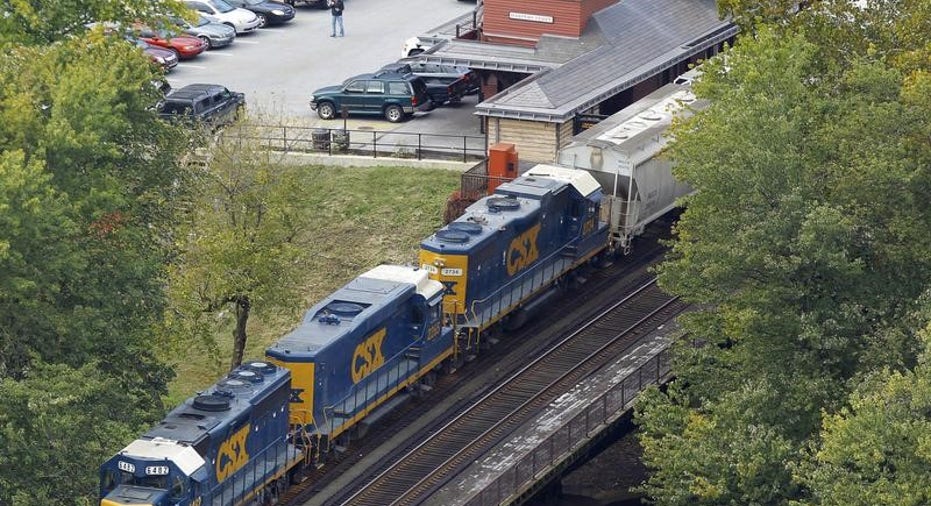Investigate CSX rail disruptions, trade groups ask US regulators

Dozens of U.S. trade groups have asked federal rail regulators to investigate CSX Corp's
The letter, from the Rail Customer Coalition sent on Monday, is the latest challenge to CSX Chief Executive Hunter Harrison's effort to ramp up productivity at the Jacksonville, Florida-based railroad and fulfill investor expectations for substantially better financial performance.
The 44 trade groups, representing chemical and agricultural companies, steel and auto makers, and beer producers and importers, among other companies, told U.S. lawmakers on House and Senate Transportation committees "chronic service failures" could degrade the nation's broader rail network.
"This has put rail dependent business operations throughout the U.S. at risk of shutting down, caused severe bottlenecks in the delivery of key goods and services, and has put the health of our nation's economy in jeopardy," they said.
The shipper groups want Congress to make it easier for them to file complaints and allow other operators to use CSX track during service disruptions, according to their letter.
A spokeswoman for Representative Peter DeFazio from Oregon said his office received the letter and is "continuing to monitor the situation."
The other lawmakers to whom the letter was sent - U.S. Senators John Thune of South Dakota and Bill Nelson from Florida, and Representative Bill Shuster of Pennsylvania - did not immediately respond to requests for comment. Nor did the Surface Transportation Board.
CSX spokesman Rob Doolittle said the company has acknowledged that some customers are experiencing service issues as Harrison implements his vision for driving efficiency, known as Precision Scheduled Railroading.
The letter comes about two weeks after the Surface Transportation Board notified Harrison of complaints about CSX's service. And an analyst survey last month found shippers have moved freight to rival Norfolk Southern Corp
CSX's service problems were exacerbated by an Aug 2 derailment in rural western Pennsylvania that forced the company to re-route trains. Federal safety officials are investigating the cause of the accident.
The recent issues have caused some investors to sell since the stock hit a 52-week high of $55.48 on July 13. The stock is off about 10 percent since news of CSX problems came to light in July.
Jason Seidl, an analyst at Cowen & Co, said the problems at CSX were bound to improve with time.
"We have seen railroads be in far worse position and recover," Seidl said.
BUMPS IN THE ROAD
Harrison apologized to customers in a July 31 letter for service disruptions since he took the job as CEO in March, and assigned blame to a few employees who have "pushed back."
When asked about customer reactions during CSX's quarterly earnings call earlier this month, Harrison said, "I don't know, frankly, how to get there without some bumps in the road."
The Rail Customer Coalition's letter echoes complaints from current and former employees and union officials who told Reuters that job cuts and changes to operating procedures are disrupting service.
Shippers and employee sources said Harrison's changes and cuts are causing rail cars and trains to sit idle or be re-routed across multiple states, delaying product shipments, and leading to inadequate customer service.
In one Aug. 3 email seen by Reuters, a CSX division manager in Florida said Crowley Maritime Corporation hauled 150 container loads by truck from Charlotte, North Carolina, to Jacksonville, Florida, and then loaded them onto Florida East Coast Railway trains to avoid CSX's system issues.
A Crowley spokesman declined to comment.
CSX's Doolittle declined to discuss the Florida incident. Regarding the broader complaints being raised, Doolittle said, "Ultimately the changes we are making will enable better service to customers."
Data from the Association of American Railroads (AAR) shows CSX weekly rail car dwell times - the average time a car sits at a terminal - have crept up to 29.4 hours through the week of August 4, the last available, versus 26.2 hours for the same week last year. Train speeds dropped to 18.7 mph versus 20.7 mph for the same period.
Current and former CSX employees say the railroad is suffering from poor communication from leadership, job cuts, and rapid changes to operations - like doubling train sizes, shutting hump yards where train cars are sorted, increasing the frequency of crew changes on a service line, and blocking overtime pay.
In Montgomery, Alabama, dwell times jumped to 60.9 hours from 35.8 hours a year earlier, and doubled in Nashville, Tennessee, to 71.9 hours. However, some of CSX's cost-cutting moves do not appear to be dramatically affecting operating performance in other locations, based on data CSX provides to the AAR.
At CSX's Barr Yard in Chicago, roughly seven managers now run the company's service line, down from more than 35 managers a month ago, an employee told Reuters. The overall work force has been halved by furloughs, he said.
Even so, weekly dwell times in Chicago have risen and fallen by several hours over the past month, and were basically unchanged from a year ago, federal data shows.
Doolittle, the CSX spokesman, declined to discuss the situation in Chicago.
(Additional reporting by Nick Carey in Detroit, Allison Lampert in Montreal and Michael Flaherty in New York; editing by Joe White and Edward Tobin)



















